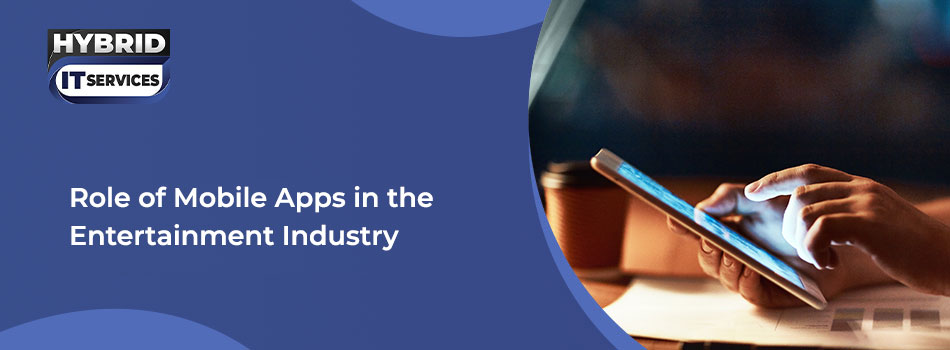The entertainment industry has transformed dramatically over the past decade, thanks to advancements in mobile technology. Mobile apps have changed how people have fun. With smartphones and tablets, entertainment is now easy to access. People can watch movies, play games, listen to music, and use social media anytime, anywhere. Apps make everything simple and enjoyable.
Mobile apps also offer personalized experiences, recommending content based on user preferences. This has transformed the industry, making entertainment more interactive and enjoyable. At Hybrid IT Services, we will explore the different ways mobile apps have impacted the entertainment world.
The Rise of On-Demand Entertainment
On-demand content is one of the biggest shifts in the entertainment industry. People no longer have to follow rigid schedules to watch TV shows, listen to music, or read books. Mobile apps have put entertainment at users' fingertips, allowing them to access content whenever and wherever they want.
Streaming Services
Streaming apps like Netflix, Hulu, Disney+, and Amazon Prime Video have changed how people watch movies and TV shows. Many now prefer these apps over traditional TV and cinema. They offer a huge selection of content that users can watch anytime. Features like personalized recommendations and offline viewing are important. Access on multiple devices makes streaming easy and convenient.
Music and Podcast Streaming
Music apps like Spotify, Apple Music, and YouTube Music let people stream millions of songs instantly. Users can enjoy personalized playlists, AI-based song recommendations, and even listen offline. These features have changed how people experience music. Similarly, podcast apps like Google Podcasts and Pocket Casts have made digital storytelling and news more popular and accessible.
E-Books and Audiobooks
Platforms like Kindle, Audible, and Apple Books have transformed reading habits. People can now carry thousands of books in their pockets, making literature more accessible than ever. Audiobooks, in particular, have gained popularity among busy individuals who prefer listening to stories while driving or working out.
Gaming Industry Boom
The gaming industry has experienced massive growth, thanks to mobile apps. What was once a console- or PC-dominated space has now become accessible to casual gamers through smartphones.
Mobile Gaming Popularity
Games like PUBG Mobile, Call of Duty Mobile, and Clash of Clans have reached millions of players worldwide. The convenience of mobile gaming has expanded the market, bringing in users who wouldn't typically invest in gaming consoles or high-end PCs.
In-App Purchases and Monetization
Many mobile games are free to play but make money through in-app purchases, ads, and subscriptions. This approach helps game developers earn while keeping players engaged. It has become a highly successful way to offer fun and exciting content. See payment system integration techniques for seamless transactions.
Augmented Reality (AR) and Virtual Reality (VR) Gaming
Mobile apps have also introduced AR and VR gaming experiences. Apps like Pokémon GO use AR technology to mix the real world with digital fun. This makes games more exciting and interactive. As AR and VR improve, mobile games will become even more amazing.
Apps like Pokémon GO use AR technology to mix the real world with digital fun. Learn about implementing real-time features for interactive experiences.
Social Media and User-Generated Content
Social media apps have become major sources of entertainment. People spend hours watching videos, looking at pictures, and sharing memes. Platforms like Instagram, TikTok, and Facebook now mix social networking with entertainment, making them more engaging than ever.
Short-Form Video Entertainment
Apps like TikTok, Instagram Reels, and YouTube Shorts have changed entertainment. They let users create and share short, fun videos. Viral challenges, trends, and influencers keep people engaged and coming back for more.
Live Streaming and Interactive Content
Live streaming is now very popular. Apps like Twitch and YouTube Live let gamers, musicians, and creators interact with fans in real time. This helps entertainers connect, get feedback, and even earn money through donations and subscriptions.
The Role of Mobile Apps in Event and Ticket Booking
Mobile apps have made it easier than ever to book tickets for concerts, movies, sports events, and live performances. Apps like Ticketmaster, Eventbrite, and StubHub allow users to browse, book, and even resell tickets with just a few taps.
Virtual and Hybrid Events
Apps now let people enjoy concerts and events from home. Platforms like Zoom and Clubhouse host virtual shows, discussions, and fan meetups. This makes entertainment easy to access for everyone, no matter where they are.
Personalized User Experience Through AI and Big Data
One of the biggest advantages of mobile apps in entertainment is their ability to deliver personalized experiences. AI-driven recommendation engines analyze user preferences and viewing habits to suggest relevant content.
Smart Content Recommendations
Streaming platforms use AI algorithms to recommend movies, TV shows, or songs based on user history. This keeps audiences engaged and increases retention rates. For example, Netflix's recommendation system analyzes watch history and ratings to suggest content tailored to individual users.
Customized Playlists and Feeds
Music apps create playlists based on what people like to hear. Social media apps show content that matches user interests. This personalization keeps people engaged and makes entertainment more fun.
Advertising and Marketing in the Entertainment Industry
Mobile apps have also revolutionized how entertainment content is marketed. Advertisers use targeted ads on social media, streaming services, and mobile games to reach specific audiences.
Influencer Marketing
Brands now work with social media influencers to promote movies, music, and games. This works well because influencers have loyal followers who trust their opinions.
Interactive and Gamified Ads
Many entertainment apps use interactive ads like mini-games or video previews. These ads keep users engaged before they access content. They work better than regular ads because they grab attention without being annoying.
The Future of Mobile Apps in Entertainment
The entertainment industry is always changing, and mobile apps will keep shaping its future. New technologies like AI, 5G, and blockchain will make mobile entertainment even better.
AI-Driven Content Creation
AI-generated music, videos, and virtual influencers are becoming more prevalent. Apps may soon allow users to create personalized AI-driven entertainment.
5G and Enhanced Streaming Quality
The rollout of 5G technology will improve streaming speeds, reducing buffering times and enabling ultra-high-definition content. This will make mobile entertainment smoother and more immersive. Explore our mobile app development services for next-gen entertainment platforms.
Blockchain and Digital Ownership
Blockchain is now part of the entertainment industry to keep digital ownership clear and secure. NFTs let people buy and sell exclusive content like digital art, music, and videos.
Conclusion
Mobile apps have changed entertainment by making it easy to access, interactive, and personal. Streaming, gaming, and social media apps have redefined how people enjoy content.
As technology grows, apps will offer even more exciting ways to experience entertainment. Whether watching a movie, playing a game, or joining a live event, mobile apps make entertainment more fun and convenient than ever. Consult now to build your cutting-edge entertainment app.






